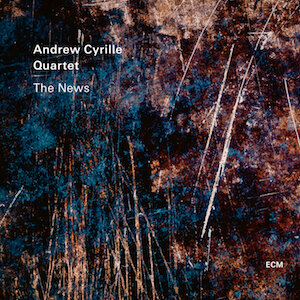Label: ECM Records, 2021
Personnel - Bill Frisell: guitar; David Virelles: piano, synth; Ben Street: double bass; Andrew Cyrille: drums.
The News, the second platter offered by a quartet led by accomplished drummer/composer Andrew Cyrille, encompasses different flavors and spices that should be tried. There's one change in the group's lineup with the addition of Cuban pianist David Virelles, a logical replacement for the late Richard Teitelbaum, who died last year at the age of 80. Virelles had never played with guitarist Bill Frisell before but had enlisted Cyrille and bassist Ben Street to support him on his 2012 album Continuum.
The album opens with the imperturbable composure of Bill Frisell’s “Mountain”, which brings a sheen-polished dose of Americana to the table. Virelles opts for a deep and dark sonority here, but not on “Leaving East of Java”, a piece by pianist Adegoke Steve Colson where his adventuresome choices include an instinctive Latin tinge and a captivating avant-jazz nimbleness. The tune, previously tackled by Cyrille in the company of his Trio 3 partners - saxist Oliver Lake and bassist Reggie Workman - starts with a long intro before entering in that soft groove that gradually increases in speed while inviting to improvisation.
In addition to the album's aforementioned opener, Frisell contributes two other pieces: “Go Happy Lucky”, a blues where his mellow guitar licks go beautifully with the piano accompaniment that emerges from the low register, and “Baby”, whose genuine sense of bonhomie makes us rest in a clear sea of tranquility. At this spot, Cyrille’s just-right brushwork shows how poetically expressive his art form can be.
The bandleader encourages interpretive freedom with “The News”, an electronic-fueled avant-garde piece he wrote that favors collective interaction, and also “Dance of the Nuances”, in which he shared compositional efforts with Virelles, straddling genres through an amalgam of elements drawn from ambient, avant-garde, experimental and electronic music.
I couldn’t leave Virelles’ “Incienso” without a mention because those poignant piano chords laid over a sensuous rhythm caught my ear immediately. Not only the interplay between Frisell and Virelles provides a wider, often polyphonic scope, but also Street’s sense of restraint and Cyrille’s impeccable rhythmic embellishments become preponderant so that everything sounds pleasantly organic as it is.
Cyrille’s specialty was always free and avant-garde jazz but this quartet opens further possibilities, making his musical menu diversified. It’s also a perfect fit for the known ECM sound.
B+
Favorite Tracks:
03 - Go Happy Lucky ► 06 - Baby ► 07 - Dance of the Nuances








































